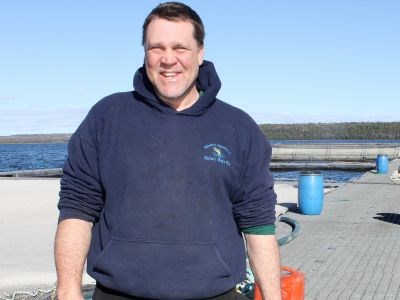Arriving at Meeker's Aquaculture, owner Mike Meeker is so busy answering the rings of three phones that his faithful dogs, Roscoe and Maddy, stand in as the welcoming committee at the Manitoulin Island fish farm.
Since word spread about the efficacy of Meeker's Magic Mix, a homegrown compost comprised of fish offal and sawdust, Meeker's phone—actually, all three of them—has been ringing off the hook.
Meeker's Magic Mix was the first spinoff from the Evansville aquaculture operation, which has been in the business of growing rainbow trout on Lake Wolsey since 1984, but the self-described problem-solver is constantly innovating, whether it's designing an underground fish hatchery for Vale or conceiving submergible cages that avoid winter storms by spending the cold months under water.
“Mother Nature is challenging us all the time and, as a farmer, you have to adapt, modify and figure out ways around it because you're not going to beat it,” Meeker said.
Agriculture is a tough business, but Meeker's stubborn streak keeps him going. After the popularity of his compost took off—mining giant Vale is amongst the believers—he discovered a secondary fan base amongst cities and golf courses looking to deter pests like Canadian geese from fouling their green spaces.
Meeker is teaming up with Vale on a second project, an underground fish hatchery at Creighton Mine in Copper Cliff, which will grow fish for stocking in local waters. Fish grown in a surface greenhouse last year responded well and are now ready to stock, and Meeker estimates the underground operation will be up and running this year.
Tanks in the hatchery will be equipped with sensors and videocameras, connected wirelessly to a control centre on the surface, which will allow Meeker to check in on the fish at any time, monitoring oxygen levels and collecting data.
“It's a neat combination of simple and high-tech,” Meeker said.
Meeker's ingenuity proved invaluable a decade ago when ice movement in the spring damaged his cages. Frustrated at the cost and time eaten up by the problem, he devised a submergible cage that can be sunk in the fall before ice forms and brought back to the surface in the spring.
The cage's guard rails slide down to become level with the deck, a top net is applied to keep the fish in and the floats are filled with water to reduce positive buoyancy. The whole cage is then pulled down by a winch connected to a concrete block on the lake bottom, a process that takes a mere 20 minutes but saves a bundle in cost and maintenance. Other fish farmers are now approaching him to retrofit their cages to be submergible.
An ongoing biogas project involves capturing the methane generated by the compost process and turning it into renewable energy that can be used to power an entire fish farm. Meeker also sat on a national committee formed to set up standards for organic products; the guidelines have passed second reading with the Canadian Standards Board and will be implemented soon.
Meeker's passion project is getting government regulations surrounding aquaculture changed. He's highly critical of the Ministry of the Environment, which he said throws up blockades that prevent fish farmers from doing business.
He and the Northern Ontario Aquaculture Association, of which he is president, have been working for years to get clear guidelines from the provincial and federal governments about fish farming in Ontario.
“There is complicated, regulatory stuff in government, and it makes for an inefficient and expensive process to go through, which is drastically reducing the ability to get new businesses going,” he said.
Meeker said recent announcements in the federal and Ontario budgets to reduce the length of time of the approvals process gives him hope that change may be coming.
Travelling the globe to speak about aquaculture, Meeker maintains Canada has the most stringent requirements surrounding aquaculture in the world, yet fish from other countries under lower standards is still being imported, and sold at a higher cost.
His overarching goal is to grow more fish for consumption at home and make Canadians more aware of the value in local product.
“We want Canadians to understand, Ontarians in particular, exactly what these organic standards are, why they were put in there and to recognize that they can get this organic product in Ontario,” he said. “That's what I'm working towards.”




